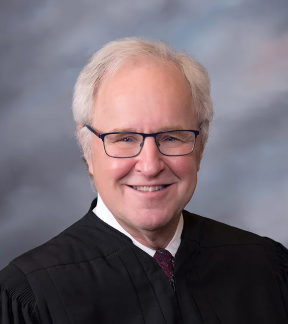
Eric Rosen
TOPEKA, Kan. - A traffic stop and search that led to the discovery of two pounds of meth was improper, the Kansas Supreme Court has ruled, because the driver never should have been pulled over.
That driver, Brian Beck, had a frame around his license plate that obscured the name of the state. In a July 3 opinion, the court overturned his conviction by finding deputy sheriff Brian Rose had no reason to stop him on Interstate 70.
"Rose could not have had a reasonable suspicion that Beck was violating Kansas law by driving with a partially obscured state name because Kansas does not require that a state name be displayed on a license plate in a clearly legible manner," Justice Eric Rosen wrote.
The decision overturned two lower courts in a case that started in March 2021 in Geary County. Beck passed Rose while committing no infractions but the frame around his license plate obstructed "Illinois."
Beck was "extremely nervous" during the ensuing traffic stop, Rose said. He claimed he was driving from Springfield, Ill., to Oak Grove, Mo., but got lost.
This caused Rose to toss his plans to simply issue a warning, instead calling for his police dog. The dog sniffed out two bags of methamphetamine totaling 2.13 pounds, and prosecutors charged Beck with possession with intent to distribute, possession of a controlled substance and interference with law enforcement.
The trial court and the Kansas Court of Appeals both denied Beck's motion to suppress the evidence that alleged Rose lacked reasonable suspicion to stop him.
A two-prong test in Kansas determines whether traffic stops were justified: whether the officer's action was justified "at its inception" and "was reasonably related in scope to the circumstances which justified the interference in the first place."
A partially obstructed license plate didn't give Rose a reasonable suspicion that a crime was occurring, the court ruled. Kansas license plate law says nothing about obstruction of the state name, only that it be in a "condition to be clearly legible."
Though other Kansas courts have taken on what "clearly legible" means, Beck's case was the first featuring the state name. The Court of Appeals said state law prohibits covering half of the state name on a license plate.
But that went against a Kansas federal court ruling from 2003, in which a license plate frame obscured the top of letters in "Ohio."
"(N)o statute requires displaying the state name in an easily readable fashion," Justice Rosen wrote. "There is no standard for how the state name is to be displayed, and the display varies greatly from design to design and from state to state."








